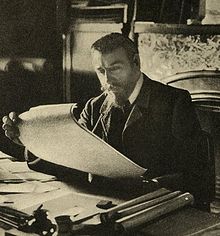Victor Horta
| Victor Horta | |
|---|---|
 |
|
| Born |
6 January 1861 Ghent, Belgium |
| Died | 8 September 1947 (aged 86) Brussels, Belgium |
| Nationality | Belgian |
| Occupation | Architect |
| Awards |
|
| Buildings | |
| Projects | Brussels-Central railway station |
| Signature | |
Victor Horta (French: [ɔʁta]; Victor, Baron Horta after 1932; 6 January 1861 – 8 September 1947) was a Belgian architect and designer. John Julius Norwich described him as "undoubtedly the key European Art Nouveau architect." Horta is considered one of the most important names in Art Nouveau architecture. With the construction of his Hôtel Tassel in Brussels in 1892-3, he is sometimes credited as the first to introduce the style to architecture from the decorative arts. The "biomorphic whiplash" style that Horta promoted deeply influenced architect Hector Guimard who used it in projects in France and extended its influence abroad.
In 1932 King Albert I of Belgium conferred on Horta the title of Baron for his services to the field of architecture. Four of the buildings he designed have been designated a UNESCO World Heritage Site.
Born in Ghent, Horta was first attracted to the architectural profession when he helped his uncle on a building site at the age of twelve.
Horta had a great interest in music since childhood and, in 1873, went to study musical theory at the Ghent Conservatory. After being expelled for bad behaviour he joined the Department of Architecture at the Royal Academy of Fine Arts in Ghent instead. In 1878 Horta left for Paris, finding work with architect and designer Jules Debuysson in Montmartre. There he was inspired by the emerging impressionist and pointillist artists, and also by the possibilities of working in iron and glass.
...
Wikipedia
